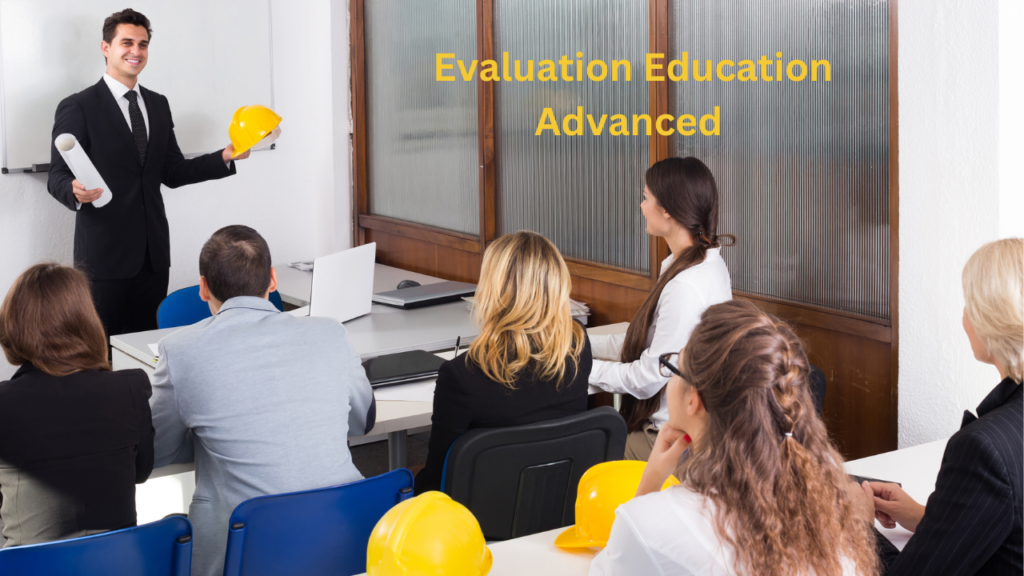Evaluation in advanced education plays a vital part in assessing progress, icing quality, and driving nonstop enhancement. This foundation of ultramodern academia not only measures pupil achievement but also refines tutoring strategies and aligns educational programs with assiduity norms. Effective evaluation education advanced systems are pivotal for equipping learners with the chops they need to succeed. As education evolves, the significance of comprehensive evaluation fabrics grows exponentially.
Methods of Evaluation Education Advanced
In, evaluation education advanced ways have evolved to give a comprehensive understanding of academic and program performance. Traditional approaches, similar as examinations and thesis evaluations, remain applicable, but newer, more dynamic styles are decreasingly making their mark.
Faculty- Grounded Assessments These assessments concentrate on scholars’ capability to apply their knowledge and chops in practical settings. By emphasizing issues over rote memorization, they foster deeper literacy and better prepare scholars for real- world challenges. faculty- grounded styles are particularly effective in courses taking critical thinking, specialized moxie, and innovative problem- working.
Design- Centered Evaluations Encouraging learners to address real- world problems, design- grounded evaluations develop critical thinking and invention. This approach aligns with advanced education’s end to prepare scholars for professional challenges. For example, engineering scholars may design functional prototypes, while business scholars might develop practicable request strategies.
Technology- Driven Tools From AI- powered platforms toe-portfolios, technology is transubstantiation the evaluation geography. These tools offer substantiated feedback, reduce impulses, and induce practicable data perceptivity. Technologies like automated essay scoring, virtual simulations, and interactive quizzes are getting masses in ultramodern classrooms.
Importance of Effective Evaluation
Robust evaluation systems are necessary for the success of advanced education, as they serve several crucial purposes
- Relating Areas of Strength and Improvement Comprehensive evaluations reveal what scholars exceed in and where fresh support is demanded. By relating skill gaps beforehand, preceptors can give acclimatized interventions.
- Enhancing Learning issues Formative feedback encourages scholars to ameliorate and fosters a growth- acquainted mindset. Regular assessments help scholars understand their progress and motivate them to strive for excellence.
- Bridging Academic and Professional Chops Evaluation systems concentrated on applicable capabilities insure scholars are equipped to meet assiduity prospects. Employers frequently seek graduates with practical moxie, and effective evaluations ensure scholars are job-ready.
Challenges in assessing Advanced Education
Despite its significance, evaluation in advanced education is not without challenges. These include
- Subjectivity in Assessments impulses in grading can compromise fairness, especially in qualitative evaluations. private factors, similar to donation style or monitor preferences, can impact issues.
- Limited coffers Some institutions face constraints in enforcing ultramodern tools and training preceptors effectively. Without acceptable coffers, maintaining harmonious and dependable evaluation processes becomes delicate.
- Keeping Pace with Change Rapid advancements in technology and educational practices near constant adaptation of evaluation styles. Staying current demands ongoing investment in tools, training, and exploration.
Inventions and Arising Trends
The future of evaluation in advanced education is being shaped by instigative inventions
- Individualized Assessments AI- driven platforms acclimatize to individual literacy styles, furnishing more accurate and applicable evaluations. For illustration, adaptive testing adjusts question difficulty grounded on a pupil’s performance in real time.
- Data- Driven Analytics Advanced tools offer practicable perceptivity for perfecting tutoring styles and pupil issues. These perceptivity help preceptors identify trends, cover progress, and upgrade classes to meet pupil requirements.
- Cooperative Peer Review Involving scholars in peer assessments fosters collaboration and enhances understanding of the subject matter. Peer reviews encourage active participation and give scholars precious feedback from their peers.
Broader operations of Evaluation
- Evaluation styles extend beyond the classroom, impacting multiple angles of advanced education
- Faculty Performance Reviews Just as scholars are assessed, faculty members also suffer evaluations to insure tutoring quality and class effectiveness.
- Institutional Accreditation Evaluation plays a pivotal part in delegation processes, icing that institutions meet public and transnational norms.
- Program Development Data collected through evaluations helps shape unborn courses, making them more applicable and poignant for learners.
Alternative Key Takeaways: Benefits of Effective Evaluation
- Improves Student Engagement Regular feedback keeps scholars motivated and engaged with their literacy process.
- Promotes Responsibility Transparent evaluation processes ensure fairness and encourage both scholars and preceptors to meet high norms.
- Drives Institutional Growth Data from evaluations helps institutions upgrade classes and align programs with global trends.
- Fosters Lifelong Learning By promoting a growth mindset, evaluations inseminate habits of tone- enhancement that extend beyond formal education.
Steps to Strengthen Evaluation Systems
To maximize the benefits of educational evaluation , institutions should
- Invest in Technology Incorporate AI tools and digital platforms to enhance evaluation delicacy and effectiveness.
- Give Training for preceptors Equip faculty with the chops demanded to apply different and ultramodern assessment ways.
- Encourage Pupil Involvement Include scholars in developing and enriching evaluation systems to insure applicability and fairness.
- Prioritize nonstop enhancement Regularly update evaluation fabrics to keep pace with advancements in education and technology.
Conclusion
Evaluation education advanced is a dynamic process that underpins academic success and invention. By espousing ultramodern ways and addressing challenges, educational institutions can ensure that their evaluation systems remain effective and indifferent. As technology and methodologies continue to evolve, the future of evaluation pledges to be indeed more poignant, shaping learners who are ready to thrive in a fast- changing world.
Effective evaluation isn’t just about assessing knowledge, it’s about fostering growth, inspiring confidence, and preparing scholars for the demands of the hereafter. Embracing these advancements is a step toward a more informed, professed, and able global community. With a focus on nonstop enhancement and invention, evaluation will remain at the heart of academic excellence for generations to come.


